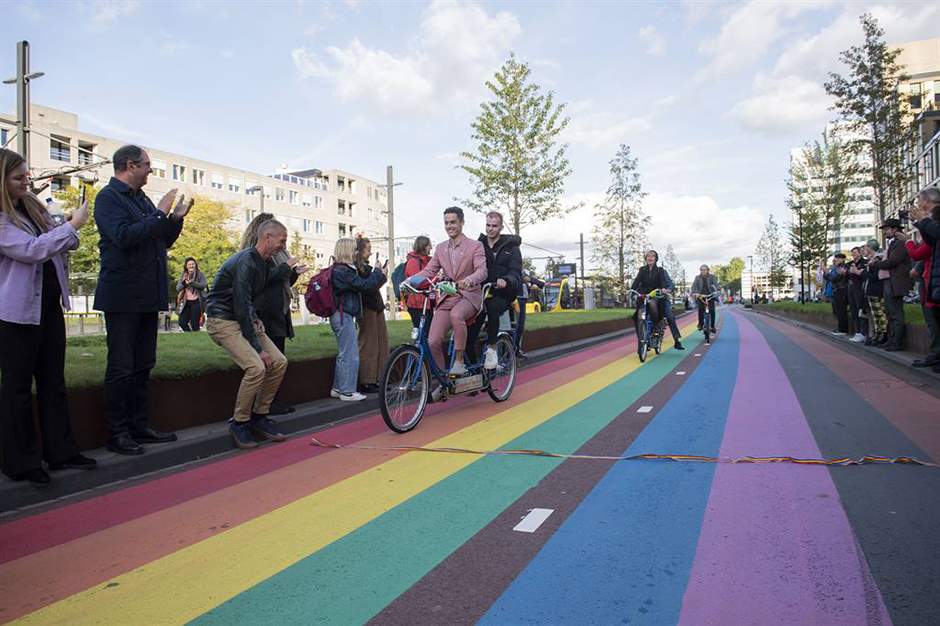Diversity and inclusiveness
As described in our vision of The New Utrecht School, we want to offer a diverse and inclusive learning environment. In 2022 we developed a number of specific activities to this end.
Student wellbeing
In 2022 we also paid extra attention, because of the consequences of the coronavirus pandemic among others, to increasing students’ wellbeing Where possible we focused on students’ development in keeping with The New Utrecht School .
For example in 2022, together with Utrecht University, we organized training and workshops on student wellbeing and development . In this way we want to stimulate students to develop skills like autonomy and self-reflection that are needed in the society of the future. In 2022 for the first time we also put out a questionnaire among Medical students to establish to what extent they feel that they know themselves and have a sense of belonging. The results of this survey are expected in the first quarter of 2023.

Inclusive introduction
In 2022 we organized an inclusive introduction to try and ensure that every student - regardless their background, gender, religion, or possible disability - would feel welcome and be able to get off to a good start in their studies. Besides the regular introduction, students were for example able to take part in the KICK-start program , a 2-day program prior to the regular introduction. In this program, future students receive extra information on what exactly studying will entail, what they can expect, and what kind of help and support is available. In this way we contribute to making them feel welcome and at home.
As in 2021, all first-year students are attributed a mentor in the first year, to whom they can go with all their questions. Besides practical matters, the well trained mentor also pays attention to the social aspect: connecting with others and with the program/faculty. In this way we help to create a community and give students a feeling of belonging to it.
Observership program for refugee students
In the summer of 2022 we organized an Observership program for five refugee students. The program consisted of a week-long (Medical) Summer School, and for six weeks after that, the students went to classes three days a week in the departments of Surgery, Pediatrics, and Gynecology. The remaining two days of the week, they followed an alternating program that included clinical skill training, evidence-based medical assignments, and master classes in various disciplines. Four of the five students were thus able to graduate with the 10 ECTs (European Credit Transfer System) that they obtained. The fifth student had already graduated.
Outreach activities
To be available for each other, we also spent a lot of attention to outreach activities in 2022. Over five hundred children from the age group 6 to 8 for example took part in the Summer School Junior and got to see how much fun and fascinating science is. Thanks to the traveling DNA lab the children could do various little experiments and activities on the subject of DNA. During the UMC Utrecht - U-talent bachelor lectures afternoon in 2022, about eighty interested school children had the chance to attend short subject lectures and ask all their questions on the topics to lecturers and students in Medicine and Biomedical Sciences. In 2022 some fifteen secondary and pre-university (HAVO and VWO) pupils whose parents had not studied also took part in the U-talent-UP program . The pupils had lectures in Biomedical Sciences, Medicine, Bioinformatics, and Pharmacology, among others. In the scope of JINC Baas van Morgen (Boss of the Future), 17-year-old VMBO pupil Harun Mohamed took on the job of Executive Board member Remco van Lunteren for a day . He could thus experience what it’s like to manage a training hospital.
Research on experiences in inclusiveness
In 2022 we did a study on experiences of in- and exclusion among Medical students . It appeared that there is still much room for improvement to make Medical training programs more inclusive, so that students will be better prepared to work with a diverse patient population. Doctors and lecturers could thus be made even more aware of the importance of inclusiveness, course material could be made more diverse, and research populations could be more diverse as well.
Inclusive curriculum toolbox
In 2022, based on focus groups with students and in collaboration with Utrecht University, we launched a toolbox for lecturers and curriculum planners to make education more diverse and inclusive and create a safe class environment. The toolbox for instance includes rules and guidelines to make language more inclusive, include various perspectives in education (material), and get rid of stereotyping in case studies. The toolbox is divided into the five topics ‘learning goals, course material, teaching and learning activities, the role of the lecturer, and testing’, and emerged from the research project ‘Developing an Inclusive Curriculum and Learning Environment’ of Utrecht University together with UMC Utrecht.